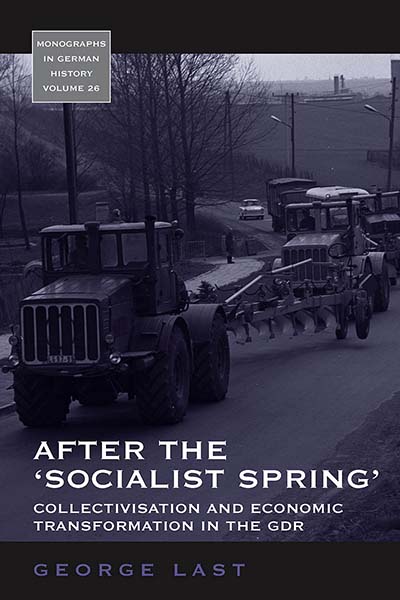
Series
Volume 26
Monographs in German History
See Related
History JournalsEmail Newsletters
Sign up for our email newsletters to get customized updates on new Berghahn publications.
After the 'Socialist Spring'
Collectivisation and Economic Transformation in the GDR
George Last
Full Text PDF | Full Text ePUB Made available under a CC BY-NC-ND 4. license with support from Knowledge Unlatched.
288 pages, 4 illus., bibliog., index
ISBN 978-1-84545-552-1 $135.00/£104.00 / Hb / Published (March 2009)
ISBN 978-1-80073-730-3 $19.95/£15.95 / Pb / Published (November 2022)
Reviews
“In discussing the changes in ownership…and administrative organization…[the author]relies mostly on vast, rarely examined archives of official reports and assessments…Extensive source references, bibliography…and an adequate index are included.” • Choice
“I genuinely enjoyed reading this book, and would recommend it as worthwhile reading for scholars and general readers interested in the history of the GDR, the dynamics of collectivization, rural histories, and/or state formation and interactions between states and their citizens. Last’s work is tremendously useful for understanding the tools and processes that enabled socialist states to develop legitimacy and authority… [It] makes an important contribution in drawing our attention to the fascinating history of collectivization and in revealing the complex interactions between state and society that characterized collectivization in the GDR.” • German Politics & Society
“In this impressive work, George Last makes an important contribution to GDR studies. Historians have devoted relatively little attention to the agricultural and rural history of postwar eastern Germany…[This book] fills a gap in the literature, and it provides another illustration of the complex relationships between state and society in the GDR.” • H-Net Reviews
“Last’s book is a balanced account of a hitherto neglected field of research. It highlights the close, though conflict-ridden interaction and communication that characterized the relationship between party rule and society in the GDR.” • German Studies
Description
Historical analysis of the German Democratic Republic has tended to adopt a top-down model of the transmission of authority. However, developments were more complicated than the standard state/society dichotomy that has dominated the debate among GDR historians. Drawing on a broad range of archival material from state and SED party sources as well as Stasi files and individual farm records along with some oral history interviews, this book provides a thorough investigation of the transformation of the rural sector from a range of perspectives. Focusing on the region of Bezirk Erfurt, the author examines on the one hand how East Germans responded to the end of private farming by resisting, manipulating but also participating in the new system of rural organization. However, he also shows how the regime sought via its representatives to implement its aims with a combination of compromise and material incentive as well as administrative pressure and other more draconian measures. The reader thus gains valuable insight into the processes by which the SED regime attained stability in the 1970s and yet was increasingly vulnerable to growing popular dissatisfaction and economic stagnation and decline in the 1980s, leading to its eventual collapse.
George Last holds a BA from Oxford University and took his MA and Ph.D. at University College London, where he has also taught. He is currently a Senior Civil Servant in the UK Civil Service.
Subject: History (General)History: 20th Century to Present
Area: GermanyCentral/Eastern Europe
After the 'Socialist Spring' by George Last is available open access under a Creative Commons Attribution-NonCommercial-NoDerivatives 4.0 International License (CC BY-NC-ND 4.0) with support from Knowledge Unlatched.
Full Text PDF | Full Text ePUB
OA ISBN: 978-1-78920-108-6




